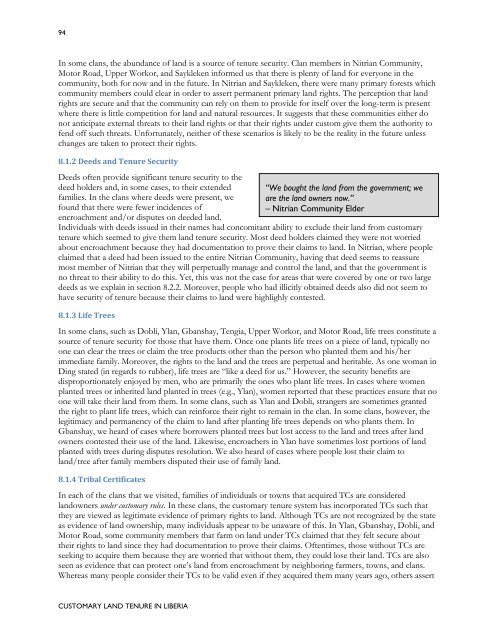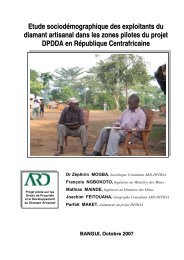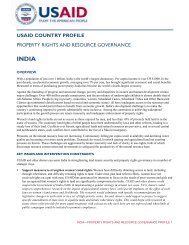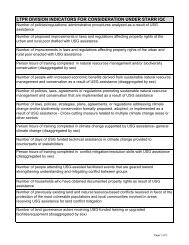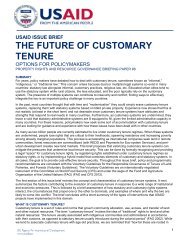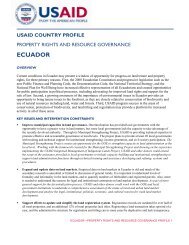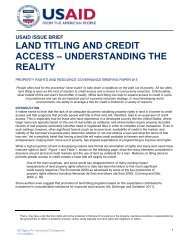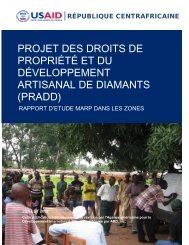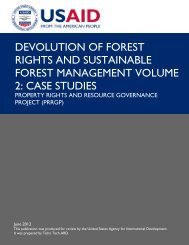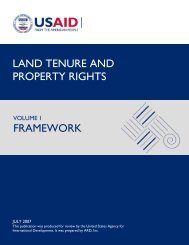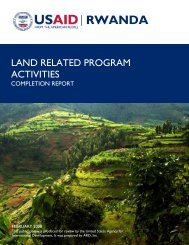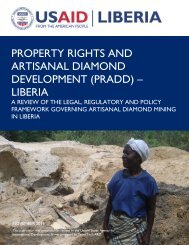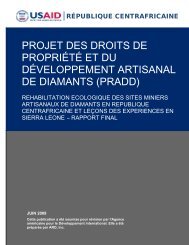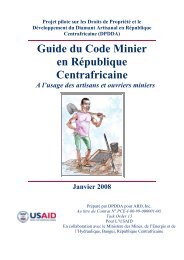Customary Land Tenure in Liberia - Land Tenure and Property ...
Customary Land Tenure in Liberia - Land Tenure and Property ...
Customary Land Tenure in Liberia - Land Tenure and Property ...
You also want an ePaper? Increase the reach of your titles
YUMPU automatically turns print PDFs into web optimized ePapers that Google loves.
94<br />
In some clans, the abundance of l<strong>and</strong> is a source of tenure security. Clan members <strong>in</strong> Nitrian Community,<br />
Motor Road, Upper Workor, <strong>and</strong> Saykleken <strong>in</strong>formed us that there is plenty of l<strong>and</strong> for everyone <strong>in</strong> the<br />
community, both for now <strong>and</strong> <strong>in</strong> the future. In Nitrian <strong>and</strong> Saykleken, there were many primary forests which<br />
community members could clear <strong>in</strong> order to assert permanent primary l<strong>and</strong> rights. The perception that l<strong>and</strong><br />
rights are secure <strong>and</strong> that the community can rely on them to provide for itself over the long-term is present<br />
where there is little competition for l<strong>and</strong> <strong>and</strong> natural resources. It suggests that these communities either do<br />
not anticipate external threats to their l<strong>and</strong> rights or that their rights under custom give them the authority to<br />
fend off such threats. Unfortunately, neither of these scenarios is likely to be the reality <strong>in</strong> the future unless<br />
changes are taken to protect their rights.<br />
8.1.2 Deeds <strong>and</strong> <strong>Tenure</strong> Security<br />
Deeds often provide significant tenure security to the<br />
deed holders <strong>and</strong>, <strong>in</strong> some cases, to their extended<br />
families. In the clans where deeds were present, we<br />
found that there were fewer <strong>in</strong>cidences of<br />
encroachment <strong>and</strong>/or disputes on deeded l<strong>and</strong>.<br />
Individuals with deeds issued <strong>in</strong> their names had concomitant ability to exclude their l<strong>and</strong> from customary<br />
tenure which seemed to give them l<strong>and</strong> tenure security. Most deed holders claimed they were not worried<br />
about encroachment because they had documentation to prove their claims to l<strong>and</strong>. In Nitrian, where people<br />
claimed that a deed had been issued to the entire Nitrian Community, hav<strong>in</strong>g that deed seems to reassure<br />
most member of Nitrian that they will perpetually manage <strong>and</strong> control the l<strong>and</strong>, <strong>and</strong> that the government is<br />
no threat to their ability to do this. Yet, this was not the case for areas that were covered by one or two large<br />
deeds as we expla<strong>in</strong> <strong>in</strong> section 8.2.2. Moreover, people who had illicitly obta<strong>in</strong>ed deeds also did not seem to<br />
have security of tenure because their claims to l<strong>and</strong> were highlighly contested.<br />
8.1.3 Life Trees<br />
In some clans, such as Dobli, Ylan, Gbanshay, Tengia, Upper Workor, <strong>and</strong> Motor Road, life trees constitute a<br />
source of tenure security for those that have them. Once one plants life trees on a piece of l<strong>and</strong>, typically no<br />
one can clear the trees or claim the tree products other than the person who planted them <strong>and</strong> his/her<br />
immediate family. Moreover, the rights to the l<strong>and</strong> <strong>and</strong> the trees are perpetual <strong>and</strong> heritable. As one woman <strong>in</strong><br />
D<strong>in</strong>g stated (<strong>in</strong> regards to rubber), life trees are “like a deed for us.” However, the security benefits are<br />
disproportionately enjoyed by men, who are primarily the ones who plant life trees. In cases where women<br />
planted trees or <strong>in</strong>herited l<strong>and</strong> planted <strong>in</strong> trees (e.g., Ylan), women reported that these practices ensure that no<br />
one will take their l<strong>and</strong> from them. In some clans, such as Ylan <strong>and</strong> Dobli, strangers are sometimes granted<br />
the right to plant life trees, which can re<strong>in</strong>force their right to rema<strong>in</strong> <strong>in</strong> the clan. In some clans, however, the<br />
legitimacy <strong>and</strong> permanency of the claim to l<strong>and</strong> after plant<strong>in</strong>g life trees depends on who plants them. In<br />
Gbanshay, we heard of cases where borrowers planted trees but lost access to the l<strong>and</strong> <strong>and</strong> trees after l<strong>and</strong><br />
owners contested their use of the l<strong>and</strong>. Likewise, encroachers <strong>in</strong> Ylan have sometimes lost portions of l<strong>and</strong><br />
planted with trees dur<strong>in</strong>g disputes resolution. We also heard of cases where people lost their claim to<br />
l<strong>and</strong>/tree after family members disputed their use of family l<strong>and</strong>.<br />
8.1.4 Tribal Certificates<br />
“We bought the l<strong>and</strong> from the government; we<br />
are the l<strong>and</strong> owners now.”<br />
– Nitrian Community Elder<br />
In each of the clans that we visited, families of <strong>in</strong>dividuals or towns that acquired TCs are considered<br />
l<strong>and</strong>owners under customary rules. In these clans, the customary tenure system has <strong>in</strong>corporated TCs such that<br />
they are viewed as legitimate evidence of primary rights to l<strong>and</strong>. Although TCs are not recognized by the state<br />
as evidence of l<strong>and</strong> ownership, many <strong>in</strong>dividuals appear to be unaware of this. In Ylan, Gbanshay, Dobli, <strong>and</strong><br />
Motor Road, some community members that farm on l<strong>and</strong> under TCs claimed that they felt secure about<br />
their rights to l<strong>and</strong> s<strong>in</strong>ce they had documentation to prove their claims. Oftentimes, those without TCs are<br />
seek<strong>in</strong>g to acquire them because they are worried that without them, they could lose their l<strong>and</strong>. TCs are also<br />
seen as evidence that can protect one‟s l<strong>and</strong> from encroachment by neighbor<strong>in</strong>g farmers, towns, <strong>and</strong> clans.<br />
Whereas many people consider their TCs to be valid even if they acquired them many years ago, others assert<br />
CUSTOMARY LAND TENURE IN LIBERIA


